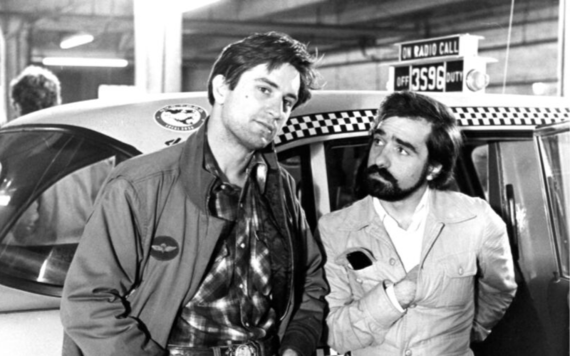The Irishman was released on Netflix just in time for Thanksgiving. Today we ask what's behind director Martin Scorsese's enduring fascination with the Irish mob?
From films like Goodfellas to Gangs of New York to The Departed to The Irishman, Scorsese's Irish themed films comment eloquently on perhaps his greatest theme of all: the allure and elusiveness of the American Dream.
It turns out Scorsese has been telling more or less the same story, obsessively, for almost five decades. It's a story as old as America itself - and the Irish and the Italians have both seen it from the business end. Scorsese shows the two ethnicities as comrades, not equal in arms but close nonetheless.
Read more: Everything you need to know about The Irishman
Director John Patrick Shanley once remarked he was so good at portraying Italians in movies like Moonlighting because he lived cheek by jowl in a mixed neighborhood alongside them. Doubtless, Scorsese had the same observational powers as an Italian kid in a very ethnic city.
The basic storyline goes like this: a kid from the mean streets considers his options for getting ahead. His choice usually involves a shovel, a boxing glove or a gun. Most choose guns.
Goodfellas - Henry Hill
Flash forward ten years and our "hero" is suddenly surrounded by fast molls, fine cigars and more money than he knows how to count. The journey from humble origins to the upper echelons has been neck-breakingly swift. Ray Liotta as Irish gangster Henry Hill perfectly fits the profile of a Scorsese Irish mobster, never the insider because of ethnic birth but the next best thing to a full mobbed-up made Italian man on the rise.
This, of course, is the career trajectory of well-known gangsters of both the Irish and Italian varieties, and no one knows this better than Martin Scorsese, who has written a kind of alternative history of the United States with his films, but its a history they don't teach you in high school.

A still from The Irishman: Al Pacino and Robert De Niro.
At this point in every crook's rise comes a wrinkle, usually, it's the feds, or the CIA, or new politicians on the rise, or worse.
Like Icarus, our "hero" has flown too high and there are a hundred would-be rivals come to pick him off.
What makes Scorsese such a gifted chronicler of both the Irish and Italian American crime story is that he knows these guys intimately, sometimes quite literally - he deeply understands their struggles, but he scrupulously maintains his objectivity.
Violent sociopath - downtrodden underdog
In a Scorsese film, you can be a violent sociopath and a devoted family man simultaneously. He will permit the audience to make their own judgments about that. He neither celebrates or condemns, he simply turns his unblinking lens on the mean streets and captures what he sees.

Robert De Niro and Martin Scorsese on set of Taxi Driver.
One of the most recurring themes in Scorsese's films is the immigrant's awareness that the game of American life is rigged against the little people - and that is an Italian and Irish inheritance if ever there was one.
Arriving on these shores and being mocked or menaced, our ancestors learned that people here like to talk about the rules but they very rarely play by them.
So it's inevitable that the Italian and Irish mobs should be a recurring subject because chronicling neighborhood wise guys means chronicling the rise of immigrants.
The Gangs of New York
The Gangs Of New York showed us Daniel Day-Lewis as the bigoted Bill the Butcher, leader of the nativist hordes who targeted the famine era Irish for expulsion in the Five Points, a brutal baptism that our ancestors never forgot.
In Goodfellas Robert De Niro plays Jimmy Conway, a paranoid Irish American hood who would shoot his own mother to protect his stash.
The Departed
In The Departed, Jack Nicholson plays an obvious Whitey Bulger avatar called Frank Costello, a man who would slay his own shadow if he thought it had crossed him.
Read more: Top ten Irish mob movies that lit up the screen
What unites these films isn't just criminality of these working-class Irish neighborhoods and characters, it's also the poverty and desperation that remains mostly just out of the frame, but that gives their lives their character and ambition.
The Irishman - Frank Sheeran
But the somber tone of The Irishman is really something new for Scorsese, however. In the film, he makes it clear that what drives De Niro's Irishman is the same insatiable need for security and advancement, but this time it comes with a dim awareness that the price he pays for the real world riches is too high.
Check out the trailer to Scorcese's latest Irish gangster movie, The Irishman:
There's a kind of growing exhaustion in De Niro's brilliant portrait of Frank Sheeran, there's a kind of surrender in it too because after a long life of betrayals and brutal mob hits Sheeran finds that he can't say if it was worth it, nor can he even pretend to care.
His life long struggles have finally drained the ambition and energy from him - but instead of achieving a deeper insight he just shrugs. That shrug is the most unforgettable and chilling thing I have ever seen in Scorsese's films.
The Irish mob doesn't have the cohesion and history of the Mafia, but their experience as immigrants deeply resonates with Scorsese, who sees cultural parallels that illuminate and comment on his own cinematic obsessions.
The Irishman pulls the curtain back to expose its "hero" at the films close. In doing so it quietly suggests that the American Dream may be as phony as the Land of Oz. Sheeran ends his days in a nursing home where is unvisited and unremembered. Even the camera seems to forget him in the final frame.
Talk about mean streets.
Will you be watching The Irishman over Thanksgiving? What's your favorite Scorcese movie? Let us know in the comments section below.
Read more: Scorsese’s new movie The Irishman is officially the best movie of all time




Comments